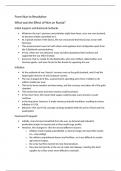From War to Revolution
What was the Effect of War on Russia?
Initial Support and Bolshevik Setbacks
Whatever the tsar’s previous uncertainties might have been, once war was declared,
he became wholly committed to it.
At a special session of the Duma, the tsar announced that Russia was at war with
Germany.
This announcement was met with cheers and applause from all deputies apart from
the 5 Bolshevik representatives.
In fact, when war was declared, many socialists abandoned their policies and
supported the war effort instead.
Everyone, that is, except for the Bolsheviks, who were vilified, called traitors and
German agents, and were forced to flee Russia for opposing the war.
Inflation
At the outbreak of war, Russia's currency was on the gold standard, and it had the
largest gold reserves of any European country.
The war changed all of this, as government spending went from 4 million to 30
million roubles per year.
This led to heavy taxation and borrowing, and the currency was taken off of the gold
standard.
This meant that more and more money could be printed.
In the short term, this meant that wages could be paid, and commerce could
continue.
In the long term, however, it made money practically worthless, resulting in severe
inflation in 1916.
Between 1914 and 1916, average earnings doubled while the price of food and fuel
quadrupled.
Food and Transport
Initially, many farmers benefited from the war, as demand and industrial
production/output increased and so they made large profits.
However, this changed in 1916 for several different reasons:
o inflation made trading unprofitable, so farmers began to hoard their stocks
(i.e., stop selling).
o the military requisitioned horses and fertiliser, so it was difficult to sustain
agricultural output.
o the army had first claimed to most food products.
o they also had priority in the use of roads and railways, meeting the food
supplies to civilian areas were difficult to maintain.
, Famine became a constant reality for much of Russia, especially in Petrograd, due to
the number of arriving refugees and its remoteness to food producing areas.
It was the disruption of the transport system rather than the decline in food
production that was the major cause of Russia's wartime shortages.
Although the railway had been improved dramatically, it was not able to bear the
pressures put on it by the war.
Signalling systems broke down and broke and blocked lines, and steam trains
stranded by engine failure and lack of coal became commonplace.
For example, in the port of Archangel, there was so great a build-up of supplies that
they sank into the ground and the under the weight of new supplies.
Sometimes, the food rotted and had to be thrown away.
As a result, food couldn’t be distributed effectively.
By 1916, Petrograd and Moscow only received 1/3 of their food and fuel
requirements.
Living Conditions
Unsurprisingly, the disruption to supply lines made living and working conditions
increasingly poor.
Inflation also played a part in this.
The cost of living increased as well.
A report from an okrhrana agent stated that ‘even if we estimate the rise in earnings
at 100%, the prices of products have risen by 300%’.
Pre-war 1916
Average income of an 2-3 roubles 5-6 roubles
electrician
Monthly rent of a shared 2-3 roubles 8-12 roubles
room
Prohibition
At the beginning of the war, the tsar introduced a ban on the production and sale of
alcohol, in an attempt to remove any distraction from the war effort.
This backfired, and there were two main consequences:
o The government directed nearly 1/3 of its revenue from taxes on alcohol
sales, and so lost money.
o It increased resentment for this are, particularly amongst the peasants and
workers, and caused social unrest.
Once the effect of prohibition was realised, prohibition was repealed in 1916.
But by then the damage was done and it was too late for recovery.




